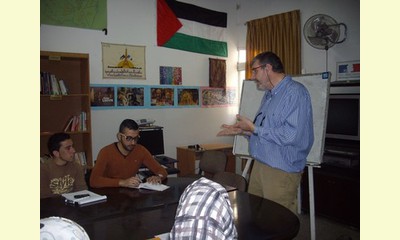|
|
Palestine: The Center for Peace organizes a meeting about freedom of expression
un articulo por Ziad Medoukh
On Thursday, April 24, 2014, at its office, the
Peace Centre of Al-Aqsa University in Gaza, held a
very interesting meeting on freedom of expression
that was led by Mr. Philippe Agret, office manager
of AFP - Agence France -Presse in the Palestinian
territories.

click on photo to enlarge
Mr. Ziad Medoukh, coordinator of the Peace Centre,
opened the meeting with a few words of
introduction. He specified that it was part of
the Centre's policy, which is to organize meetings
for young people of Gaza. He stressed the
importance of this activity. Its aim is to give
youth the opportunity to express themselves and
speak freely about, their lives, their
environment, their social problems, their way of
seeing things and analyze them.
At first, Mr. Agret spoke about journalistic work
of the French media in Palestine. Then he
presented his agency, explaining how it was
created and how it works in the West Bank and Gaza
Strip. He added that the AFP bureau in Gaza was
first opened in the 90s and it continues to work
despite all difficulties.
For over an hour, the speaker addressed several
topics related to the program of the meeting, such
as the expression of personal and political
opinions, as well as how the law operates and
protects the freedom of expression.
He dialogued extensively with the 22 students
present on different aspects of this controversial
issue in our society.
This new event organized in our Centre for Peace,
reflects the importance of work and dialogue with
young people in the Gaza Strip.
In the end, it was decided to organize a
journalistic writing workshop organized by the team
of AFP in Palestine for students of the Department
of French.
(Click here for a French version of this article)
|








|
DISCUSSION
Pregunta(s) relacionada(s) al artículo :
Free flow of information, How is it important for a culture of peace?
* * * * *
Comentario más reciente:
:
Perhaps the simplest way to illustrate the essential importance of free flow of information for a culture of peace is to discuss the importance of the control of information for the culture of war.
Here are excerpts from an Washington Post investigation two years ago entitled Top Secret America: A hidden world, growing beyond control. To read the original, click here.
"* Some 1,271 government organizations and 1,931 private companies work on programs related to counterterrorism, homeland security and intelligence in about 10,000 locations across the United States.
* An estimated 854,000 people, nearly 1.5 times as many people as live in Washington, D.C., hold top-secret security clearances.
* In Washington and the surrounding area, 33 building complexes for top-secret intelligence work are under construction or have been built since September 2001. Together they occupy the equivalent of almost three Pentagons or 22 U.S. Capitol buildings - about 17 million square feet of space.
* Many security and intelligence agencies do the same work, creating redundancy and waste. For example, 51 federal organizations and military commands, operating in 15 U.S. cities, track the flow of money to and from terrorist networks.
* Analysts who make sense of documents and conversations obtained by foreign and domestic spying share their judgment by publishing 50,000 intelligence reports each year - a volume so large that many are routinely ignored." . . .
"Every day across the United States, 854,000 civil servants, military personnel and private contractors with top-secret security clearances are scanned into offices protected by electromagnetic locks, retinal cameras and fortified walls that eavesdropping equipment cannot penetrate. . .
Much of the information about this mission is classified. That is the reason it is so difficult to gauge the success and identify the problems of Top Secret America, including whether money is being spent wisely. The U.S. intelligence budget is vast, publicly announced last year as $75 billion, 21/2 times the size it was on Sept. 10, 2001. But the figure doesn't include many military activities or domestic counterterrorism programs."
As we said in the draft Declaration and Programme of Action on a Culture of Peace that we sent from UNESCO to the UN General Assembly in 1998:
"98. It is vital to promote transparency in governance and economic decision-making and to look into the proliferation of secrecy justified in terms of 'national security', 'financial security', and 'economic competitiveness'. The question is to what extent this secrecy is compatible with the access to information necessary for democratic practice and social justice and whether, in some cases, instead of contributing to long-term security, it may conceal information about processes (ecological, financial, military, etc.) which are a potential threat to everyone and which need therefore to be addressed collectively."

|
|









